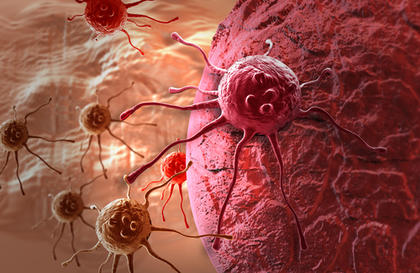 The mistaken activation of certain cell-surface receptors contributes to a variety of human cancers. Knowing more about the activation process has led researchers to be able to induce greater vulnerability by cancer cells to an existing first-line treatment for cancers (mainly lung) driven by a receptor called EGFR. The team, led by Eric Witze, PhD, an assistant professor of Cancer Biology in the Perelman School of Medicine at the University of Pennsylvania, published their findings this month in Molecular Cell.
The mistaken activation of certain cell-surface receptors contributes to a variety of human cancers. Knowing more about the activation process has led researchers to be able to induce greater vulnerability by cancer cells to an existing first-line treatment for cancers (mainly lung) driven by a receptor called EGFR. The team, led by Eric Witze, PhD, an assistant professor of Cancer Biology in the Perelman School of Medicine at the University of Pennsylvania, published their findings this month in Molecular Cell.
“We found that inhibiting an enzyme that adds the fatty acid palmitate onto proteins creates dependence by cancer cells on EGFR signaling for survival,” Witze said. By using a small molecule called 2-bromo-palmitate (2BP) that inhibits these palmitate-adding enzymes, the researchers surmise that cancer patients might be able to one day make their cells more sensitive to cancer-fighting EGFR inhibitors.
Palmitate is the most common fatty acid found in animals, plants, and microbes, although is not well studied. Proteins that have palmitate bound to them are usually associated with the cell membrane. Palmitate allows these proteins to transfer chemical signals from outside the cell to inside via the cell membrane.
EGFR itself is a transmembrane protein associated with palmitate, and by blocking palmitate, EGFR becomes hyperactivated. “We thought that this finding would be ‘good’ for the cancer, but ‘bad’ for a cancer patient,” Witze said. In cancers not related to EGFR signaling, this relationship is correct; however, in cancers related to EGFR, if the palmitate-adding enzyme is inhibited, EGFR is activated, but cancer cells grow more slowly.
In addition, if genifitib, an inhibitor to EGFR itself on the market for lung cancer, is added to the cell, the cells die. This finding is somewhat counterintuitive with regard to cell growth since EGFR activation functions as a positive growth signal, the researchers note; however, that fact cells die when EGFR is inhibited is not counterintuitive, but shows the cells are now addicted to the EGFR signal.
“It’s as if a switch is stuck on,” Witze said. “The cell loses control of the growth signal.” If no palmitate is associated with EGFR, then it the cell loses control of this signal, and if the EGFR inhibitor is added, cells die.”
The research shows that the reversible modification of EGFR with palmitate “pins” the tail of EGFR to the cell, impeding EGFR activation. The researchers think when the tail is no longer able to be pinned to the membrane the switch is stuck in the “on” position.
Currently, the experimental 2BP compound inhibits any enzyme that uses palmitate as a substrate, making it toxic to most cells. “We need to find a compound specific for the palmitate-adding enzyme and or modify 2BP to make it more specific to decrease unwanted side effects.” Witze said.
Source: UPenn
Filed Under: Genomics/Proteomics



